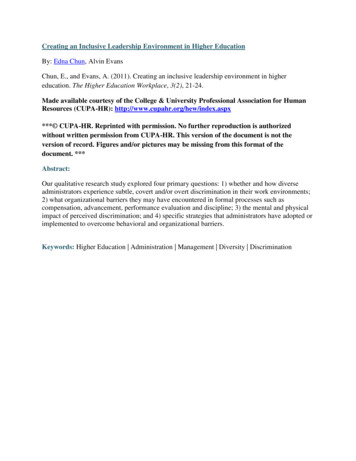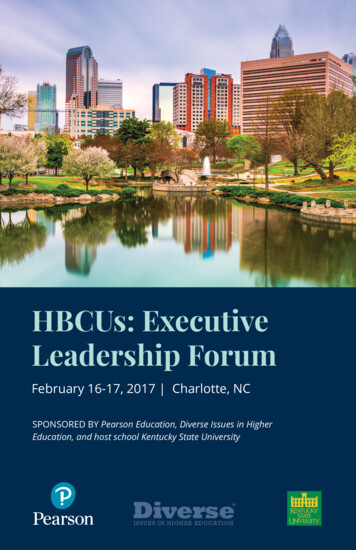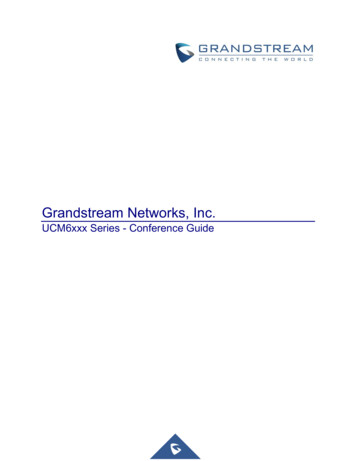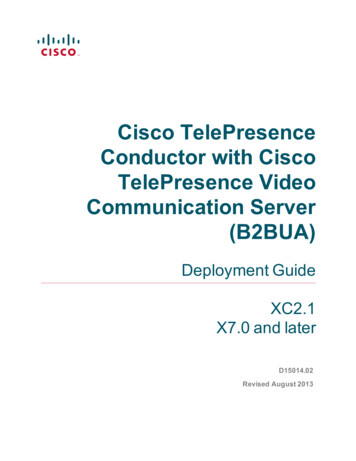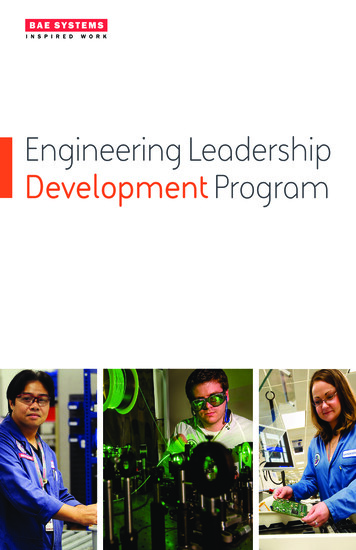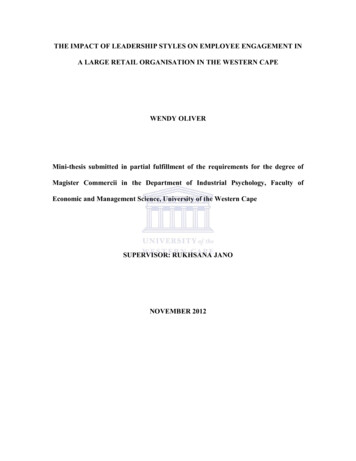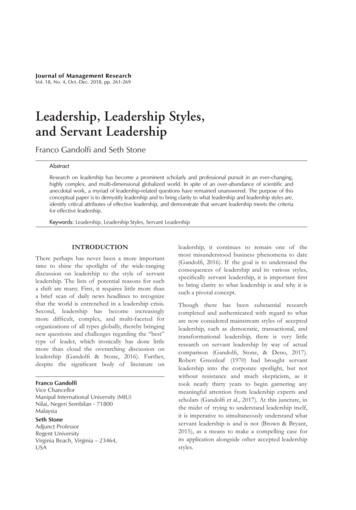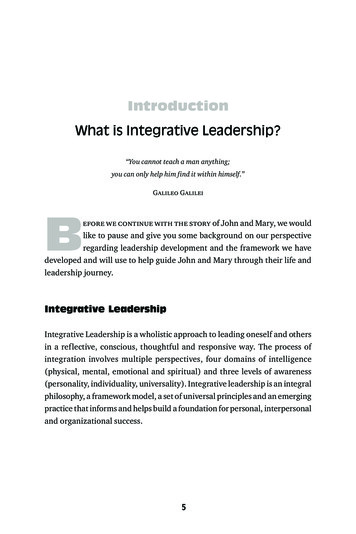
Transcription
2010 Higher EducationLeadership ConferenceNew Realities For Higher EducationNew York, NY— November 4–5, 2010
About the TIAA-CREF InstituteThe mission of the TIAA-CREF Institute is to build knowledge,support thought leadership, and enhance understanding of strategicissues related to the business of higher education and lifelong financial security. A respected source of knowledge and expertise, theTIAA-CREF Institute sponsors and conducts objective, relevantresearch, allies with nationally recognized educational leaders, convenes conferences and symposia, and administers highly regardedawards programs. This conference is part of the TIAA-CREF InstituteSeries on Higher Education—resources developed to help college anduniversity leaders effectively address challenges and opportunities.For more information, please visit: www.tiaa-crefinstitute.org.
A MESSAGE FROMROGER W. FERGUSON, JR.Welcome to TIAA-CREF and to the 2010 TIAA-CREF InstituteHigher Education Leadership Conference.The theme – Charting the Way: New Realities for Higher Education –is particularly timely and relevant. Even though we see hopeful signsof an economy on its way to full recovery, the past few years haveleft a perhaps permanently altered landscape filled with challengesand new opportunities.That’s why the kind of dialogue and information-sharing you’ll findhere over the next two days is so important. Framed by presentationsgiven by an outstanding, diverse, and passionate group of experts, wewill examine creative strategies and best practices for the academyto become more efficient, more effective, and more responsive to newdemands and changing needs.We are privileged to have as our keynote speaker one of the mostdistinguished names in higher education thought leadership, Dr. WilliamBowen. We are also honored to welcome Cokie Roberts as our eveningevent speaker. Their insights, acumen and candor will bring additionalperspectives to challenge our thinking.I appreciate your partnership in addressing issues of criticalimportance to the future of our nation’s colleges and universities.TIAA-CREF understands that our higher education system is thebedrock for our nation’s strength and our position in the world.We know that the forces of international competition demandgreater innovation from the labor force, from educators, and frompolicymakers. Since 1918, TIAA-CREF has been and is increasinglycommitted to working with you and for you to ensure America’splace as the global gold standard for higher education.Sincerely,Roger W. Ferguson, Jr.President and Chief Executive OfficerTIAA-CREF2010 Higher Education Leadership Conference www.tiaa-crefinstitute.org1
A MESSAGE FROMSTEPHANIE BELL-ROSEIt is with great pleasure that I welcome you and join you as a participantin the Institute’s 2010 Higher Education Leadership Conference.This year’s conference closes out a decade of enormous change in ourcountry and our world with incredible implications for higher education.Presented with a mosaic of new realities, promise and potential, thereare choices to be made to keep America’s colleges and universitiesvibrant, relevant, and competitive. Since its creation 12 years ago, theTIAA-CREF Institute has helped to inform the decisions faced byhigher education leaders and policy makers. We have provided objective quality research, publications, symposia, and conferences likethe one that brings us here today. And as we begin a new decade, theInstitute is poised to build on its legacy of support to the academiccommunity through new strategies and a continuation of invaluablepartnerships with you and other higher education leaders, associations and institutions to advance mutual goals.I gratefully recognize our conference presenters, who will set thestage, and invite all of you to contribute to the discussions. Collectively,we bring a tremendous amount of experience and expertise plus a keenawareness of the pre-eminent importance of higher education as thebasis for our nation’s global leadership and competitiveness.As we enter this new decade, challenges as well as expectations maybe greater. Charting the way won’t be easy, but TIAA-CREF and theTIAA-CREF Institute are committed and honored to stand withyou as we navigate the waters together.Sincerely,Stephanie Bell-RoseTIAA-CREF Managing Director and Head of the TIAA-CREF InstituteTIAA-CREF Institute2For Institutional Investor Use Only. Not for Use With or Distribution to the Public.
Throughout the conference, time will be allocated for audience dialogue,and participation will be strongly encouraged and facilitated.THURSDAY, NOVEMBER 48:00 AM – 8:30 AMBreakfast8:30 AM – 8:45 AMWelcome8:45 AM – 10:00 AMOpening Keynote Address10:00 AM – 10:30 AMBreak10:30 AM – 12:00 PMSession I12:00 PM – 1:00 PMLunchStephanie Bell-RoseTIAA-CREF Managing Director and Head of the TIAA-CREF InstituteWilliam G. BowenPresident Emeritus, The Andrew W. Mellon Foundation;President Emeritus, Princeton UniversityCharting the Way: Focus on the FutureIt has often been said that leaders are paid to look around the corner.This session will explore current and future trends in the nation’s economyand in its need and support for higher education. What should leadersbe considering as they steer their institutions through the next few years?Which major trends are the most significant for higher education? Whatwill be the impact of these trends? How will they affect the businessmodel of higher education, and how will they affect academic directionsand emphases?Participants:Scott S. CoweN, President, Tulane UniversityMATTHEW GOLDSTEIN, Chancellor, The City University of New Yorkmary spilde, President, Lane Community CollegeDavid WheeleR, Managing Editor, The Chronicle of Higher Education(moderator)CONVERSATION CAFÉFacilitated table discussion offering an additional opportunity to askquestions and share perspectives.2010 Higher Education Leadership Conference www.tiaa-crefinstitute.org3
1:00 PM – 2:30 PMSession II2:30 PM – 2:45 PMBreak2:45 PM – 4:15 PMSession III4Finding New Opportunities: Voices of ExperienceAll institutions of higher education have been affected by the difficulteconomy and by other aspects of the environment in recent years. Someinstitutions have treated these challenges as an opportunity to try newventures, experiment with alternative modes of instruction, reshape thecurriculum to preserve quality, and/or to engage the campus in rethinkingthe mission, goals and strategies of the institution. How can institutionsmaintain quality programs, access, and academic standards in the faceof increasing costs and declining revenues? What are new initiatives thatmight be explored as institutions seek to improve without increasing cost?Participants:Michael S. Bassis, President, Westminster College, UtahJoni E. Finney, Vice President, The National Center for Public Policyand Higher Education; Practice Professor, Graduate School of Education,The University of Pennsylvania (moderator)Earl Lewis, Provost and Executive Vice President for Academic Affairs,Emory UniversityTeresa Sullivan, President, University of VirginiaMeeting New Goals for Higher EducationEarly in his presidency, President Obama announced that he is committedto ensuring that America will have the highest proportion of studentsgraduating from college in the world by 2020. He has also said that allAmericans should be prepared to enroll in at least one year of highereducation or job training to better prepare our workforce for a 21st centuryeconomy. His bold goal has been supported by the Lumina Foundation andthe Bill and Melinda Gates Foundation, both of which are awarding grantsto this end. What specifically are the goals of each of the players: theObama administration, Lumina Foundation, and Gates Foundation? Howattainable are these goals? What actions are needed by colleges anduniversities to play their part in meeting these goals? For many years,observers have indicated that the U.S. is losing its competitive positionand we need to educate more students and educate them better,especially in the STEM areas. In what ways is this movement different?Participants:Jamie P. Merisotis, President and CEO, Lumina FoundationMark David Milliron, Deputy Director, Postsecondary Improvement,Bill and Melinda Gates FoundationJack Stripling, Higher Education Reporter, Inside Higher Ed (Moderator)For Institutional Investor Use Only. Not for Use with or Distribution to the Public.
4:15 PM – 4:30 PMSpotlight on the Winner of the 2010 TIAA-CREF TheodoreM. Hesburgh Award for Leadership Excellence4:30 PM – 5:15 PMKeynote Address6:30 PMReception and Dinner – The University ClubRoger W. Ferguson, Jr., President and CEO, TIAA-CREFKeynote Speaker: Cokie Roberts, Senior News Analyst, NPR News2010 Higher Education Leadership Conference www.tiaa-crefinstitute.org5
FRIDAY, NOVEMBER 58:00 AM – 9:00 AMBreakfast9:00 AM – 9:15 AMWelcome9:15 AM – 10:30 AMSession IVAlternative Approaches: What Can We Learn?In efforts to improve the quality of instruction and reduce costs, somecolleges and universities have been exploring new strategies. Some havehired private companies to host, design, market and provide educationand student services online. Others have been trying to learn from thesuccessful for-profit universities. Many have attempted to find new waysto better use technology. This session explores a few of the strategies currently being used by colleges and universities in facing today’s challenges.What lessons can the not-for-profit sector of higher education learn from thesuccessful for-profit institutions? What alternative approaches for instruction have proven effective to maintain or increase quality of learning anddecrease costs? What are the challenges in large group, computer-basedinstruction? How can institutions address these challenges?Participants:Kent ChabotaR, President, Guilford CollegePeter P. Smith, Senior Vice President of Academic Strategies andDevelopment, Kaplan Higher EducationCarol A. Twigg, President and CEO, National Center for Academic Transformation6For Institutional Investor Use Only. Not for Use with or Distribution to the Public.
10:30 AM – 10:45 AMBreak10:45 AM – 12:00 PMSession V12:00 PM – 1:30 PMLunch1:30 PMAdjournment & Shuttles to AirportsLeadership Challenges and Leadership CourageThe recent years have been stressful for leaders in higher education. Allforecasts indicate that in the immediate future higher education will realizeneither increased revenue nor decreased demand for its services. The costof providing quality education keeps increasing. The public wants more,better, and less expensive options. Young faculty members have differentexpectations from those with more experience. Students in this digitalage learn differently, have different expectations from those of studentsof the past, and are more technologically sophisticated than many of theirteachers. How do presidents and chancellors balance the interests anddemands of trustees on the one hand with those of faculty, staff, and students on the other? How do higher education leaders prepare themselvesto face the challenges of the future and make courageous decisions in theface of opposition that is often extreme and personally discouraging? Howdo higher education leaders deal with the stresses of the job on a shortterm and long-term basis?PARTICIPANTS:Janet Holmgren, President, Mills College (moderator)Marvalene Hughes, President, Dillard UniversityDaniel J. Kaufman, President, Georgia Gwinnett CollegeWilliam E. Kirwan, Chancellor, University System of Maryland2010 Higher Education Leadership Conference www.tiaa-crefinstitute.org7
JOIN US AT THECONVERSATION CAFÉ
During lunch on Thursday, the Conversation Café offers youadditional opportunity to ask questions, share insights, and interactwith conference presenters and other participants. Here are someof the topics we’ll be discussing Emerging Demographic Trends and the Impact onHigher Education. Maintaining Quality Academic Programs in the Face ofFiscal Challenges Maintaining Employee Morale in Challenging Times Access & Affordability Achieving Diversity: How to attract students fromunderserved populations, and how to help them persistto graduation Leadership Challenges for the Future: Seeking adviceand offering suggestions Challenges in Communication - within an institution,with trustees, with the community and general public Strategic Management of Faculty Retirements Global Opportunities and International Initiatives2010 Higher Education Leadership Conference www.tiaa-crefinstitute.org9
PRESENTERSMICHAEL S.BassisPresident,Westminster College, UtahMichael S. Bassis is in his ninth year as president ofWestminster, the only private, comprehensive liberal artscollege in Utah. He is an authority on educational changeand an active participant in the national conversation on thefuture of higher education. Over the course of his 40-yearcareer, Dr. Bassis has served as a faculty member and administrator at institutions large and small, selective and non-selective, and publicand private.Shortly after his appointment at Westminster, he led the college communityin the creation of an ambitious 10-year strategic plan. Since the plan wasapproved in 2004, 15 new academic majors and eight new graduate programshave been added, total enrollment has increased by 31%, enrollment of outof-state students and students of color have both more than doubled, and theinstitution has enjoyed a rising national reputation for the quality of itslearning environment.A graduate of Brown University, Dr. Bassis holds M.A. and Ph.D. degrees inthe Sociology of Education from the University of Chicago.StephanieBell-RoseTIAA-CREF ManagingDirector and Head ofthe TIAA-CREF InstituteStephanie Bell-Rose became Managing Director ofTIAA-CREF and Head of the TIAA-CREF Institute in 2010.She has an extensive background in higher education policyand nonprofit executive leadership. Prior to her appointmentat TIAA-CREF, Ms. Bell-Rose served as President of theGoldman Sachs Foundation. She also served as Counsel andProgram Officer for Public Affairs at the Andrew W. Mellon Foundation whereshe directed legal affairs and designed philanthropicinitiatives in education and public policy. Ms. Bell-Rose is currently a Trusteeof the Independent Sector, Executive Leadership Council Foundation, American Museum of Natural History, and America’s Promise. She is an appointeeto Mayor Bloomberg’s Cultural Affairs Advisory Commission and the Dean’sCouncil of Harvard Law School. Sheis a member of the Women’s Leadership Board of the Kennedy School, theExecutive Leadership Council, the Contributions Council, The Economic Clubof New York and the Council on Foreign Relations where she serves on theMembership Committee.Ms. Bell-Rose earned an A.B. with honors from Harvard College, and wasa recipient of Harvard University’s Rockefeller Fellowship. She also receiveda J.D. from Harvard Law School, and an M.P.A from the Kennedy Schoolof Government.10For Institutional Investor Use Only. Not for Use with or Distribution to the Public.
William G.BowenPresident Emeritus,The Andrew W. MellonFoundationPresident Emeritus,Princeton UniversityWilliam G. Bowen served as President of The AndrewW. Mellon Foundation from 1988–2006, and also served asPresident of Princeton University from 1972–1988. A graduateof Denison University (A.B. 1955) and Princeton University(Ph.D. 1958), he joined the Princeton faculty in 1958 andserved as Provost there from 1967 to 1972.Mr. Bowen’s special interest in the application of information technologyto scholarship led to a range of initiatives including the Mellon Foundationsponsored creation of JSTOR (a searchable electronic archive of the full runsof core journals in many fields), the Mellon International Dunhuang Archive,ARTstor (a repository of high-quality digitized works of art and related materials for teaching and research), and Ithaka Harbors, Inc. (an organizationlaunched to accelerate the adoption of productive and efficient uses ofinformation technology for the benefit of higher education).Mr. Bowen is the author or co-author of more than 20 books, including mostrecently Crossing the Finish Line: Completing College at America’s PublicUniversities.Mr. Bowen is founding chairman of the board of Ithaka Harbors, Inc. Heserves on the boards of JSTOR/Ithaka and ARTstor, and he is the co-chairmanof the Research Alliance for New York City Schools. He also is a member ofthe American Philosophical Society and the American Academy of Arts andSciences. Mr. Bowen served on the TIAA-CREF Board of Overseers from1995–2009.Kent JohnChabotarPresident,Guilford CollegeDr. Kent John Chabotar became President and professor ofpolitical science at Guilford College in Greensboro, NorthCarolina in 2002. Previously, he served as Vice President forfinance and administration, Treasurer and senior lectureron government at Bowdoin College.Dr. Chabotar is on the governing boards of the Commissionon Colleges of the Southern Association of Colleges and Schools, CommunityFoundation of Greater Greensboro, Greensboro Rotary, and the SoutheasternCenter for Contemporary Art.Dr. Chabotar’s most recent publications include a 2006 book on strategicfinance for the Association of Governing Boards of Universities and Collegesand articles on “Coping with Financial Distress” in Trusteeship (2007) and“Blue Sky Thinking” in CASE Currents (2007).Dr. Chabotar holds a B.A. from Saint Francis University in Pennsylvania andM.P.A. and Ph.D. degrees in Public Administration from the Maxwell School atSyracuse University.2010 Higher Education Leadership Conference www.tiaa-crefinstitute.org11
Scott S.CowenPresident,Tulane UniversityScott S. Cowen is Tulane University’s 14th President. Healso holds joint appointments as the Seymour S. GoodmanMemorial Professor of Business in Tulane’s A.B. FreemanSchool of Business and Professor of Economics in theSchool of Liberal Arts.In 2009 TIME Magazine named President Cowen one of thenation’s top 10 Best College Presidents and he was one of only four universityleaders nationwide to receive the 2009 Carnegie Corporation Academic Leadership Award. In 2010, President Cowen was elected to the American Academyof Arts and Sciences, one of the world’s most prestigious honorary societies.President Cowen also serves on a number of civic, corporate, and professionalorganization boards and he has held leadership positions in national academicand professional associations, including the American Council on Education,the National Association of Independent Colleges and Universities, the NCAA,and the Council of Higher Education Accreditation. He currently serves asa board member of the National Merit Scholarship Corporation.Prior to coming to Tulane, President Cowen was a professor—and later dean—at Case Western Reserve University in Ohio for 23 years. President Cowenreceived his bachelor’s degree from the University of Connecticut in 1968. Afterserving a three-year term in the U.S. Army, he went back to school and receivedhis master’s and doctoral degrees from The George Washington University inthe fields of finance and management.ROGER W.FERGUSON, JR.President and ChiefExecutive Officer,TIAA-CREFRoger W. Ferguson, Jr. is President and Chief ExecutiveOfficer of TIAA-CREF, the leading provider of retirementservices in the academic, research, medical and culturalfields and a Fortune 100 financial services organizationwith 434.5 billion in combined assets under management(as of September 30, 2010).Mr. Ferguson served as Vice Chairman of the Board of Governors of the U.S.Federal Reserve System. He was a voting member of the Federal Open MarketCommittee, served as Chairman of the Financial Stability Forum, and chairedFederal Reserve Board committees on banking supervision and regulation, payment system policy and reserve bank oversight. Prior to joining TIAA-CREFin April 2008, Mr. Ferguson was head of financial services for Swiss Re, Chairman of Swiss Re America Holding Corporation and a member of the company’sexecutive committee. From 1984 to 1997, he was an Associate and Partner atMcKinsey & Company. He began his career as an attorney at the New YorkCity office of Davis Polk & Wardwell.Mr. Ferguson is a member of President Obama’s Economic Recovery AdvisoryBoard and served on the Transition Economic Advisory Board. He is alsoa member of the Boards of Trustees for the Institute for Advanced Study,Carnegie Endowment for International Peace, the New America Foundation,12For Institutional Investor Use Only. Not for Use with or Distribution to the Public.
and Memorial Sloan-Kettering Cancer Center. He is on the Board of Directorsof Brevan Howard Asset Management LLP and the Partnership for New YorkCity, and a member of the Council on Foreign Relations, the Economic Clubof New York, the Harvard Law School Visiting Committee, and the Groupof Thirty.Mr. Ferguson holds a B.A., J.D. and a Ph.D. in economics, all from HarvardUniversity.Joni E. FinneyVice President,The National Center forPublic Policy and HigherEducationPractice Professor,Graduate School ofEducation, The Universityof PennsylvaniaDr. Finney is nationally known for her expertise on funding,governance, and accountability in higher education. For morethan 20 years, Dr. Finney has worked with state leaders toimprove the public policies that govern higher education. Shewas Vice President of the National Center for Public Policyand Higher Education for the past ten years. Prior to that,Dr. Finney was with the California Higher Education Policy Center and theEducation Commission of the States.Dr. Finney is Director of the Institute for Research in Higher Education (IRHE)at the University of Pennsylvania. She is currently directing a five-state study,sponsored by the National Center for Public Policy and Higher Education, tounderstand the relationship between a state’s policies for higher educationand a state’s performance. Dr. Finney developed and directed the nation’s firstbiennial state-by-state report card for higher education, Measuring Up. Shewas principal author of the fifty state-by-state report cards, Measuring Up2000–2008. She has worked with governors and legislators from more than 25states and has testified before congressional committees on higher educationpolicy. Dr. Finney co-authored Public and Private Finance of Higher Education:Shaping Public Policy for the Future and Designing State Higher Education Systemsfor a New Century. She is currently co-authoring a forthcoming book, FinancingHigher Education in an Era of Global Challenge. Dr. Finney has written articlesand opinion pieces for AGB Reports, The Chronicle of Higher Education, StateGovernment News, Spectrum (The Council of State Governments), Change:The Magazine for Higher Learning, and Education Week.Dr. Finney received her bachelor’s degree in Education from WestminsterCollege. She also holds a master’s degree in Education from Bowling GreenState University, and a Ph.D. in Higher Education from PennsylvaniaState University.2010 Higher Education Leadership Conference www.tiaa-crefinstitute.org13
MatthewGoldsteinChancellor of The CityUniversity of New YorkMatthew Goldstein was appointed Chancellor of The CityUniversity of New York (CUNY), effective September 1, 1999.He is the first CUNY graduate to lead the nation’s most prominent urban public university (City College, Class of 1963).Dr. Goldstein has served in senior academic and administrative positions for more than 30 years, including Presidentof Baruch College, President of the Research Foundation, and Acting ViceChancellor for academic affairs of CUNY. Prior to being named Chancellor,he was President of Adelphi University.He has held faculty positions in mathematics and statistics at Baruch College,the CUNY Graduate School and University Center, Polytechnic Universityof New York, Cooper Union, Eastern Connecticut State University, and theUniversity of Connecticut.Currently, Dr. Goldstein is a member of the Board of Trustees of theJPMorgan Funds and of the Bronx-Lebanon Hospital Center. He is a Directorof the Lincoln Center Institute for the Arts in Education, ex officio, and a member of the Business Advisory Council for Columbia Management. By appointment of Mayor Michael R. Bloomberg, he serves as Chair of the 2010 New YorkCity Charter Revision Commission.Dr. Goldstein earned his doctorate from the University of Connecticut in mathematical statistics, and a bachelor’s degree with high honors in statistics andmathematics from The City College of The City University of New York.Dr. Janet L.HolmgrenPresident,Mills CollegeDr. Janet L. Holmgren has served as President of MillsCollege since July 1991. Prior to assuming her role at Mills,she was Vice Provost of Princeton University. Dr. Holmgrenholds an M.A. and Ph.D. in Linguistics from PrincetonUniversity. She began her faculty teaching career at theFederal City College, now the University of the District ofColumbia, in 1972. In 1976 she joined the faculty of the English Departmentat the University of Maryland College Park. From 1982 to 1988, she wasAssistant to the Chancellor at University of Maryland College Park, withresponsibility for developing policy reports and testimony to the Board ofRegents and the state legislature. In 1988, she was chosen OutstandingWoman Administrator at the University.Instrumental in shaping the national agenda for women and higher educationthrough her leadership roles at Mills and on prominent boards, Dr. Holmgrencurrently serves on the Boards of Princeton University, the Carnegie Foundation for the Advancement of Teaching, and the National Council for Researchon Women.14For Institutional Investor Use Only. Not for Use with or Distribution to the Public.
MarvaleneHughesPresident,Dillard UniversityDr. Marvalene Hughes serves as the eighth and firstwoman president appointed to lead Dillard University inNew Orleans. Dr. Hughes began her tenure as Presidentof Dillard University on July 1, 2005.Prior to beginning her tenure at Dillard University, Dr. Hughesserved as President of California State University Stanislausfor 11 years. In addition, she has served in a number of high-level, administrative positions at major research institutions (Vice President and Professor atthe University of Minnesota; Vice President and Professor at the University ofToledo; Associate Vice President at Arizona State University; and as a seniorlevel administrator and Professor at San Diego State University). Additionally,she has been an active leader in major national organizations, including theAmerican Council on Education, the Council for Higher Education Accreditation, the Association of American State Colleges and Universities, and theNational Association of State Universities and Land Grant Colleges. She wasalso elected as the National President of the American College PersonnelAssociation and the President of the National Association of CounselingCenter Directors.Dr. Hughes earned her Ph.D. in Administration and Counseling from FloridaState University, after studying at Tuskegee University, New York Universityand Columbia University. She has pursued post-doctoral study at threeHarvard University Summer Institutes and one institute at OxfordUniversity, England.Daniel J.KaufmanPresident,Georgia Gwinnett CollegeIn September 2005, Dr. Daniel J. Kaufman became theCharter President of the new Georgia Gwinnett College, located in Lawrenceville, the first new 4-year college in Georgiain over 100 years. In addition to his duties at the college,Dr. Kaufman is Vice Chair of the Georgia Gwinnett CollegeFoundation. He also is a member of the Board of Directorsof the Gwinnett County Chamber of Commerce and serves on the boardsof many other civic and educational organizations.Prior to assuming his duties as President of Georgia Gwinnett College,Dr. Kaufman was a brigadier general in the U.S. Army, serving as Dean of theAcademic Board and Chief Academic Officer at the United States MilitaryAcademy at West Point.Dr. Kaufman graduated from the United States Military Academy at WestPoint in 1968; he was commissioned a second lieutenant of Armor and awardeda Bachelor of Science degree. Dr. Kaufman also holds a Master’s of PublicAdministration from the John F. Kennedy School of Government, HarvardUniversity and a Doctorate in Philosophy in Political Science from theMassachusetts Institute of Technology. Upon his retirement from activeduty, Dr. Kaufman was honored by the British government as an Officerof the Most Excellent Order of the British Empire (O.B.E.). He is a memberof the Phi Kappa Phi Academic Honorary Society.2010 Higher Education Leadership Conference www.tiaa-crefinstitute.org15
William E.KirwanChancellor, UniversitySystem Of MarylandOn August 1, 2002, William English Kirwan became the thirdchancellor of the University System of Maryland. Prior to hispresidency, he was a member of the University of Marylandfaculty for 24 years.In May 2006, Dr. Kirwan was appointed to serve on theKnight Commission on Intercollegiate Athletics and becameco-chair of the commission in May 2007. He also serves on the Board of Directors of the Council for Higher Education Accreditation; chairs the CollegeBoard’s Commission on Access, Admissions, and Success in Higher Education;and is a member of the Business-Higher Education Forum. Dr. Kirwan is alsoa member of the Board of Directors of the Greater Baltimore Committee, theEconomic Alliance of Greater Baltimore, and the Maryland Business Roundtable for Education.Dr. Kirwan received his bachelor’s degree in mathematics from theUniversity of Kentucky and his master’s and doctoral degrees in mathematics from Rutgers, The State University of New Jersey, in 1962 and 1964,respectively. In 2002, Dr. Kirwan was elected to the American Academy ofArts and Sciences. He is co-editor of the book “Advances in Complex An
in the Institute's 2010 Higher Education Leadership Conference. This year's conference closes out a decade of enormous change in our country and our world with incredible implications for higher education. Presented with a mosaic of new realities, promise and potential, there are choices to be made to keep America's colleges and universities
